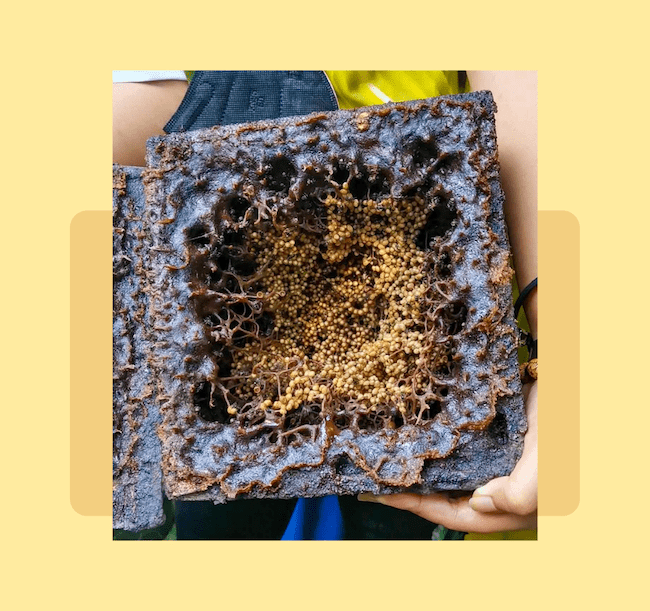Let’s learn more about stingless bees

Recently, Village Pipol Magazine went on a three-day trip with the Department of Tourism’s CALABARZON office for a farm-to-table experience. We visited at least nine farms and the last one was Milea Orchard and Bee Farm. The women-led farm specializes in taking care of stingless bees and various types of plants. In an effort to save the bees, they go around the Philippines to teach farmers in remote areas about beekeeping.

For a little bit of background, the term ‘farm-to-table’ means the food on the table came directly from the farm. This also would mean that the food didn’t go through a store, market, or distributor along the way. Similar phrases would also include ‘locally-sourced’ and ‘farm fresh.’ We experienced the phrase in its purest form where the table is located at the farm. We also went on a tour around the farms.
@villagepipol Milea Orchard and Bee Farm tells us the importance of bees for pollination that affects our lives during the Calabarzon Kulinarya Caravan: A Farm-To-Table Experience with the Department of Tourism. #fyp #foryou #VillagePipolTravel #VPTravelToCALABARZON #VillagePipolFarmToTable #VPFarmToTableWithDOT#CALABARZONKulinaryaCaravan #VPGoesToCalabarzon #VPExperienceCalabarzon #VPExperienceFarmToTable
♬ Ang Huling El Bimbo – Eraserheads
So, what are stingless bees?
Tetragonula biroi is a stingless bee native to the Philippines, usually cultivated on a farm to both produce honey and pollinate different kinds of plants. Also known as Kiwot, Lukot, Kiyot, Lukutan, or Libog, stingless bees are about the size of an ant. They have all the features of the honeybees except they do not have a sting. The country is blessed with many species of this bee. In some regions, they often become the key pollinator for agriculture.

Stingless bees aka kiwot have a small furry body that catches the pollen particles. It also pollinates the flowers they visit. Then, they would drink tiny drops of nectar, and some of this makes them into honey. Stingless bees became common visitors to flowering plants in the tropics. They are also known to visit the flowers of approximately 90 crop species. They make a contribution to the pollination of approximately 60 other species.
However, this remains insufficient information to determine their overall effectiveness or importance. Often inferred that their small size may mean that they remain good pollinators for some particular flowers. In the Philippines, it appears as if because of their small size, their colonies also remain small. They would fit between the nodes of old bamboo. Or, in this case, a small little wooden box with a hole for its entrance and exit.

Milea Orchard and Bee Farm, what do they do and what products do they get from stingless bees?
Milea Orchard and Bee Farm have a separate Filipino-owned business that offers all-natural products, Milea All Organics. It is a local brand that places a premium on the environment and sustainability. Aside from raw honey, stingless bees also create more than that.
Pure Propolis Extract
Bees also excrete a superfood called propolis. It is a resin-like material made by bees from the buds of poplar and cone-bearing trees. Bees use it to build hives and may contain beehive by-products. This makes their hive more defensible. Propolis seems to help fight against bacteria, viruses, and fungi. It also has anti-inflammatory effects and helps skin heal. Milea collects it and bottles it up into the Milea Bee Propolis Extract.
Rich in flavonoids, essential oils, phenolic compounds, vitamins, and minerals. The healing properties extend to the following:
- Stabilizing the blood pressure and sugar level
- Stimulating white blood cells
- Treating respiratory diseases such as asthma
- Healing inflammation such as ulcers
- Healing cold sores, colds, flu, and herpes
- Promoting healing of sores, wounds, acne, blemishes, eczema
- Treating skin and tissue problems such as burns, and wounds
- Treating allergies and reducing their symptoms
- Improving the digestion system and appetite
- Cancer prevention

Rare and medicinal pollen from stingless bees
The pollen tastes a bit sour and has gummy consistency because of the propolis. It remains a revolutionary source of multivitamins. And, because of that, it also boosts the immune system and increases stamina. Milea Bee Farm’s Trigona Pollen was not harvested from the wild. However, collected in clean, unpopulated mountains. This, then, ensures that we do not rob the wild of its needed pollinators. It contains the following:
- 22 amino acids
- 18 vitamins
- 25 minerals
- 59 trace elements
- 11 enzymes or coenzymes
- 14 fatty acids
- 11 carbohydrates
- approximately 25 % protein

Pure Natural Beeswax
Natural beeswax from Apis Cerana, Milea’s native honey bees. It doesn’t have any additives. Milea melts it at a low temperature. That way, antimicrobial benefits remain. It is also unbleached and unfiltered. The mixing of pollen oils into honeycomb wax turns the white wax into a yellow or brown color. Used for high cholesterol, pain, fungal skin infections, and other conditions, beeswax is also used as a thickener, emulsifier, and stiffening agent in cosmetics. Aside from that, beeswax absolute can be used as a fragrance in soaps and perfumes.

Aside from these three, Milea All Organics also sells more organic and natural products that they get from their farm. You can check them out on Shopee and Lazada.
Learn more about stingless bees and research more about them. That way, you’re clued in on their importance and what they do for our day-to-day lives.
Angela Grace P. Baltan has been writing professionally since 2017. She doesn’t hesitate to be opinionated in analyzing movies and television series. Aside from that, she has an affinity for writing anything under the sun. As a writer, she uses her articles to advocate for feminism, gender equality, the LGBTQIA+ community, and mental health among others.






